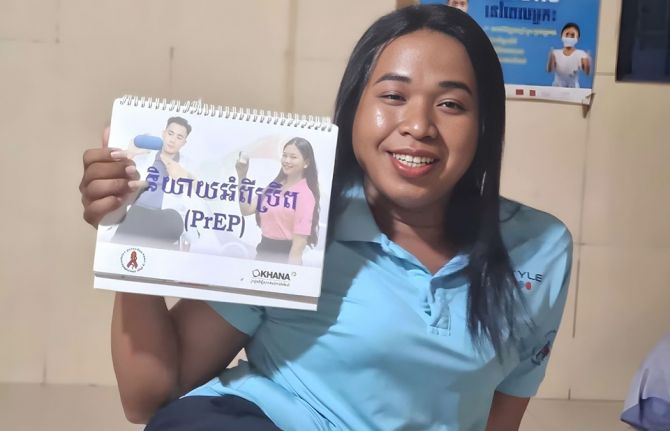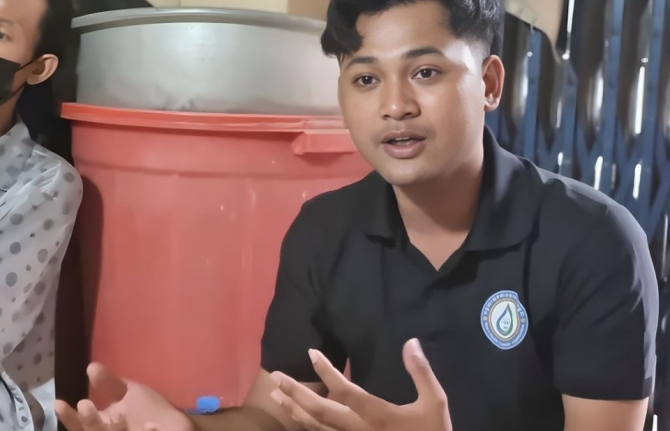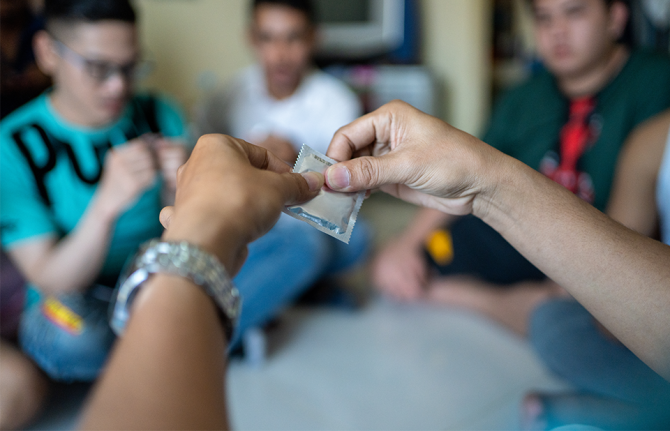



Feature Story
HIV is increasing among men who have sex with men in Cambodia; One organization is trying to turn the tide
21 May 2025
21 May 2025 21 May 2025Chhum Vy, an outreach worker for Men’s Health Cambodia (MHC), lives in Steung Meanchey, a low-income neighborhood in southern Phnom Penh. She has converted her rental house into a makeshift community centre for gay and transgender people who live in the area. To get there you pass through a Buddhist temple compound, then head down narrow streets, just wide enough for a motorbike.
Ms Vy has taped health promotion posters to the walls and arranges HIV testing and prevention tools in a corner of her living room floor. Clients leave their shoes at the door and sit in a circle on the ground for her sensitization sessions.
“I work every day, seven days a week, sometimes in the evening depending on the needs of the client,” she said.
She is on the frontlines, tackling the toughest challenge facing Cambodia’s HIV response. While new infections in the southeast Asian nation are declining among all other groups, they are increasing among gay men and other men who have sex with men. The reasons for this are complicated.
Ron Sopheab said he has lost many gay friends to AIDS. In the early 2000s one of his friends committed suicide when his family kicked him out of the house, refused to even eat with him and allowed him just a small bed outside.
The MHC workers and clients agree that stigma and discrimination against both men who have sex with men and people living with HIV have declined since those days.
“A little remains, but it is at a lower level,” Mr Sopheab said.
However, he noted that gaps in Cambodia’s progressive HIV response can still leave people susceptible to stigma and discrimination. Despite practicing safer sex in his regular life, Mr Sopheab contracted HIV during three months in a detention center where there was no access to HIV prevention tools. MHC provides him with peer support to remain adherent to treatment and gives him transportation support to attend the clinic when needed.
For Pom Rotha, it is extreme poverty that makes her vulnerable. As she is currently living in a rental room and sometimes cannot afford to pay the room fee, she is unable to renew her national identification. That means she cannot access the social support services that are a lifeline for many Cambodians. She survives through sex work and says about 5% of her clients insist on not using condoms.
“I cannot say ‘no’ because I need the money,” she said. “I try to negotiate, but if it does not work… I let it be.”
MHC provides Ms Rotha with pre-exposure prophylaxis, a preventive medicine known as PrEP, to help her avoid HIV infection if she is exposed. She said this is how she has remained HIV-free despite the risks she’s felt forced to take.
But another danger is far more pervasive. Young gay men are using the internet to find sexual partners either on hookup sites or social media. Many of them do not have the information or support they need to protect themselves.
That is why MHC has developed a digital strategy. This approach complements the physical testing, counselling and peer services it offers in ten provinces. Bun Pheng manages the online content and is himself an influencer. His team develops social media materials and campaigns about HIV prevention and MHC services. Every week they host a Facebook Live featuring experts or celebrity guests. A separate team is responsible for reaching out to clients through the gay social networking apps Grindr and Blued. Part of Mr Pheng’s job is to monitor the online comments, answering questions and interacting with the audience.
“If someone needs services, I refer them to an outreach worker to make an appointment where it’s most convenient,” he said.
Clients are offered a range of options to meet them where they are.
They can come in for testing or be mailed a self-test kit (one option tests at the same time for syphilis). MHC provides counselling before forwarding the testing kits and takes those with reactive results to the lab for confirmation. This varied approach is meant to help reach the 8% of people living with HIV in Cambodia who are not yet aware of their HIV status.
Ms Vy shows off a range of HIV prevention options. She demonstrates correct condom and lubricant use. Then she explains the basics of PrEP.
The Khmer HIV/AIDS NGO Alliance (KHANA) sends a mobile van out every night to provide education and testing in hotspot areas where gay men and transgender people go to find partners.
UNAIDS Country Director to Cambodia, Lao PDR and Malaysia, Patricia Ongpin, said more investments are needed for these community-led approaches tailored for men who have sex with men.
“Communities are responding to the realities of people’s lives in a way that state services can’t,” Ms Ongpin said. “To end AIDS we must channel resources to the organizations with the best chance of reaching those who are now being left behind.”
At the end of Ms Vy’s Sunday evening session clients leave with a bow and a handful of condoms.
“Self-stigma is really high,” Ms Vy reflected. “Societal stigma has reduced a lot, but some people still don’t want to access the services. I even had one case where after counselling a person still decided to stay away from services until she died. That is what we are working to address.”



